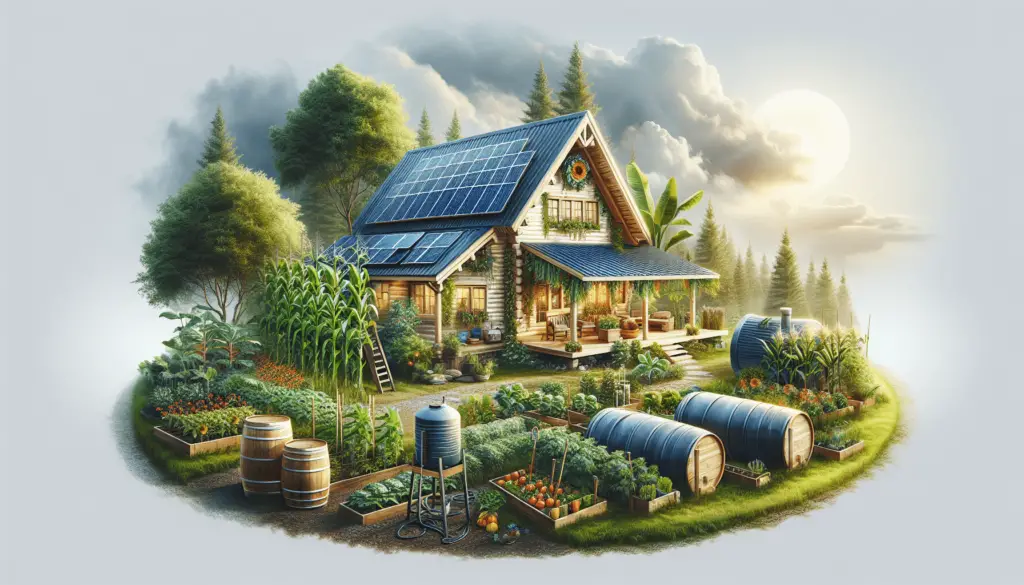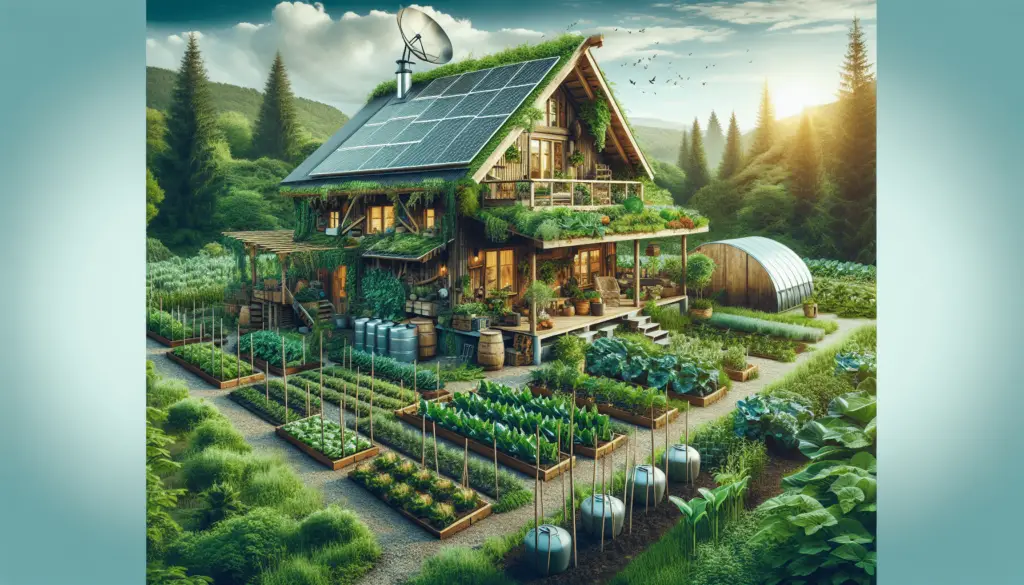Welcome to your guide on creating an eco-friendly prepper homestead! In this article, you will learn practical tips on how to create a sustainable and self-sufficient homestead while also being prepared for any unexpected emergencies. From renewable energy sources to organic gardening techniques, you will discover how to live harmoniously with the environment while also ensuring your family’s safety and well-being. Get ready to transform your homestead into a green oasis that not only benefits you but also the planet. Let’s get started on this exciting journey towards a more sustainable lifestyle! Have you ever considered creating an eco-friendly prepper homestead? With natural disasters and uncertainties in the world today, having a self-sufficient and sustainable living space can provide peace of mind and security for you and your loved ones. In this article, we will guide you through the process of creating an eco-friendly prepper homestead that is both efficient and environmentally conscious. Let’s get started!

Planning Your Eco-Friendly Prepper Homestead
When it comes to creating an eco-friendly prepper homestead, proper planning is essential. Before you can start building or making any changes to your property, it’s crucial to have a clear vision of what you want to achieve. Sit down and map out the layout of your homestead, taking into consideration factors such as energy efficiency, water management, and sustainable food production.
One of the first things to consider in your planning process is the location of your homestead. Choose a site that receives ample sunlight for solar panels, has access to clean water sources, and is suitable for growing your own food. Additionally, take into account the local climate and natural disasters that may occur in your area, such as earthquakes, hurricanes, or wildfires.
Assessing Your Energy Needs
To create an eco-friendly prepper homestead, you’ll need to assess your energy needs and determine the most sustainable sources of power. Solar panels, wind turbines, and hydroelectric generators are all viable options for generating clean energy on your property. Calculate how much energy you will need to power your home, appliances, and tools, and design a system that can meet those needs efficiently.
In addition to generating your own energy, consider implementing energy-saving measures in your home, such as installing energy-efficient appliances, LED lighting, and proper insulation. By reducing your energy consumption, you can lower your overall carbon footprint and reliance on fossil fuels.
Water Management and Conservation
Water is a precious resource, especially in a prepper homestead where self-sufficiency is key. Implementing sustainable water management practices can help you conserve water, reduce runoff, and ensure a stable water supply for your homestead. Consider installing rainwater harvesting systems, greywater recycling systems, and water-efficient irrigation techniques to make the most of the water available to you.
When planning your water systems, make sure to prioritize water purification and filtration methods to ensure that your water supply is clean and safe for consumption. Investing in a quality water filtration system can provide you with peace of mind knowing that you have access to clean water, even in emergency situations.
Sustainable Food Production
Growing your own food is a fundamental aspect of an eco-friendly prepper homestead. By cultivating a variety of fruits, vegetables, and herbs on your property, you can reduce your reliance on store-bought produce and ensure a fresh and healthy food source for your family. Consider creating a permaculture garden, planting fruit trees, and raising chickens or other livestock to enhance the sustainability of your food production.
In addition to growing your own food, explore alternative food preservation methods such as canning, fermenting, and dehydrating to extend the shelf life of your harvest. By stocking up on preserved foods, you can build a resilient food supply that can sustain you during times of scarcity.
Implementing Eco-Friendly Practices
Once you have a solid plan in place for your eco-friendly prepper homestead, it’s time to start implementing sustainable practices that will help you achieve your goals. From renewable energy systems to waste reduction strategies, there are countless ways to make your homestead more eco-friendly and self-sufficient.
Renewable Energy Systems
Renewable energy systems such as solar panels, wind turbines, and geothermal heating can provide you with a reliable and sustainable source of power for your homestead. By harnessing the power of nature, you can reduce your reliance on the grid and lower your energy costs over time. Invest in high-quality renewable energy systems that are designed to withstand the elements and provide you with long-lasting performance.
In addition to generating your own energy, consider implementing energy-saving measures in your home to reduce your overall power consumption. Simple changes such as using energy-efficient appliances, turning off lights when not in use, and insulating your home properly can make a significant impact on your energy bills and environmental footprint.
Waste Reduction and Recycling
Minimizing waste and implementing recycling practices are essential components of an eco-friendly prepper homestead. By reducing your overall waste output and recycling materials whenever possible, you can lower your environmental impact and create a more sustainable living space. Implement a composting system for organic waste, recycle paper, plastic, glass, and metal materials, and repurpose items whenever possible to reduce your reliance on landfills.
When it comes to waste reduction, it’s essential to think creatively and find ways to repurpose items that would otherwise be thrown away. Upcycling old furniture, using scrap materials for construction projects, and repairing broken items instead of replacing them are all excellent ways to reduce your waste output and save money in the long run.
Sustainable Landscaping and Gardening
Creating a sustainable landscape and garden on your prepper homestead can help you conserve water, improve soil health, and attract beneficial wildlife to your property. Implement practices such as mulching, companion planting, and natural pest control to create a thriving ecosystem that supports your food production efforts. Consider using organic gardening methods and avoiding harmful pesticides and fertilizers to protect the environment and promote healthy soil and plants.
In addition to sustainable gardening practices, explore the benefits of permaculture design principles to create a resilient and productive landscape on your homestead. By mimicking natural ecosystems and utilizing regenerative agriculture techniques, you can create a self-sustaining food system that requires minimal inputs and yields abundant harvests year after year.
Emergency Preparedness and Resilience
In a prepper homestead, emergency preparedness is paramount to ensuring the safety and security of your family in times of crisis. Create a comprehensive emergency preparedness plan that includes provisions for food, water, shelter, and medical supplies in case of a natural disaster or other emergencies. Stock up on non-perishable food items, store clean water in containers, and have a first aid kit and emergency supplies on hand to prepare for unforeseen events.
In addition to physical provisions, it’s crucial to invest in emergency communication systems such as two-way radios, satellite phones, and emergency alert systems to stay informed and connected during emergencies. Make sure to practice your emergency response plan regularly with your family members to ensure that everyone knows what to do in case of an emergency.

Conclusion
Creating an eco-friendly prepper homestead is a rewarding and fulfilling endeavor that can provide you with security, self-sufficiency, and peace of mind. By incorporating sustainable practices such as renewable energy systems, water management techniques, and sustainable food production methods, you can create a resilient homestead that is environmentally conscious and efficient. With proper planning, implementation, and dedication, you can build a sustainable living space that will provide you and your loved ones with a safe and secure environment for years to come. Good luck on your eco-friendly prepper homestead journey!
